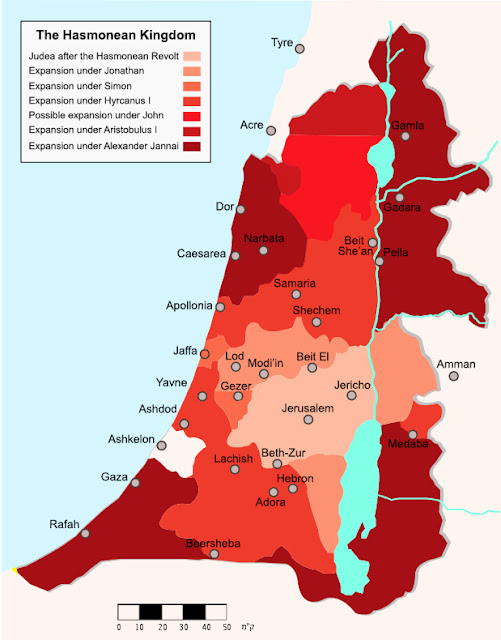 |
| King Herod and the Three wise Men |
Through treachery and murder, Herod removed all possible rivals. Then, having made his position safe, he began to develop and expand his kingdom. He ruled Judea for thirty-three years (37-4 BC). He carried out impressive building programs, two of his most notable achievements being the rebuilding of Samaria and the construction of Caesarea as a Mediterranean port. In Jerusalem he built a military fortress, government buildings, a palace for himself and a magnificent temple for the Jews (Matt 27:27; Mark 13:1; John 2:20; Acts 23:10,35).
In spite of the benefits Herod brought them, the Jews hated him. This was partly because of his mixed blood (though he was Jewish by religion) and partly because of his ruthlessness in murdering any he thought a threat to his position. His butchery was well demonstrated in his massacre of the Bethlehem babies at the time of Jesus’ birth (Matt 2:13,16).
Family of Herod
Before he died, Herod divided his kingdom between three of his sons, though they, like their father, could rule only within the authority Rome gave them. The southern and central parts of Palestine (Judea and Samaria) went to Archelaus, a man as cruel as his father but without his father’s ability (Matt 2:22). The northern part of Palestine (Galilee) and the area east of Jordan (Decapolis and Perea) went to Herod Antipas, the man who later killed John the Baptist and who agreed to the killing of Jesus (Mark 6:14-29; Luke 3:1; 23:6-12). The areas north-east of the Sea of Galilee (Iturea and Trachonitis) went to Herod Philip, a man of milder nature than the rest of his family (Luke 3:1).
Archelaus was so cruel and unjust that in AD 6 the people of Judea and Samaria asked Rome to remove him and govern them directly. From that time on, Judea and Samaria were ruled by Roman governors, or procurators, with headquarters at Caesarea. The procurators of Judea and Samaria mentioned in the Bible are Pilate, Felix and Festus (Matt 27:2; Acts 23:24,33; 25:1).
The only exception to this rule by procurators was the brief ‘reign’ of Herod Agrippa I, a grandson of Herod the Great (Acts 12:1-4,20-23). Through winning favour with Rome, he gained the former territories of Herod Philip (in AD 37) and Herod Antipas (in AD 39). In AD 41 he gained Judea and Samaria, and for three years he ruled almost the entire ‘kingdom’ of Herod the Great. Upon his death in AD 44, Judea and Samaria returned to the rule of Roman governors.
Earlier, when a governor from Rome replaced Archelaus (AD 6), the Jews for the first time had to pay taxes to the Romans direct instead of through the Herodian ruler. When Rome conducted a census to assess this tax, a group of Jews led by a man called Judas the Galilean rebelled, claiming that it was wrong for the people of God to pay tax to a pagan emperor (Acts 5:37). Because of their
zeal in trying to free Israel from pagan influence, they became known as Zealots, or Patriots, and formed a minor political-religious party in Israel (Luke 6:15; Acts 1:13).
The zealots were so opposed to Roman rule that they were prepared to fight against it. Rome’s mismanagement of Jewish affairs increased their determination, and in AD 66 they revolted openly by taking control of Jerusalem. There was much turmoil and bloodshed during the next four years, but the Romans gradually reasserted their control, first in Galilee then throughout Judea. Finally, in a series of brutal and devastating attacks, they conquered Jerusalem, massacred the people, burnt the temple and left the city in ruins (AD 70). So far as Rome was concerned, the Jewish nation was finished.







